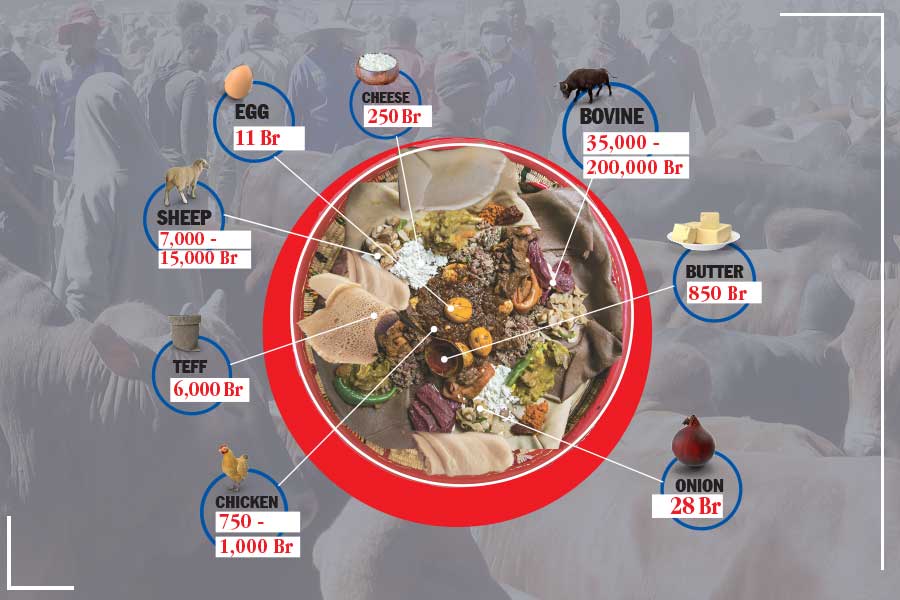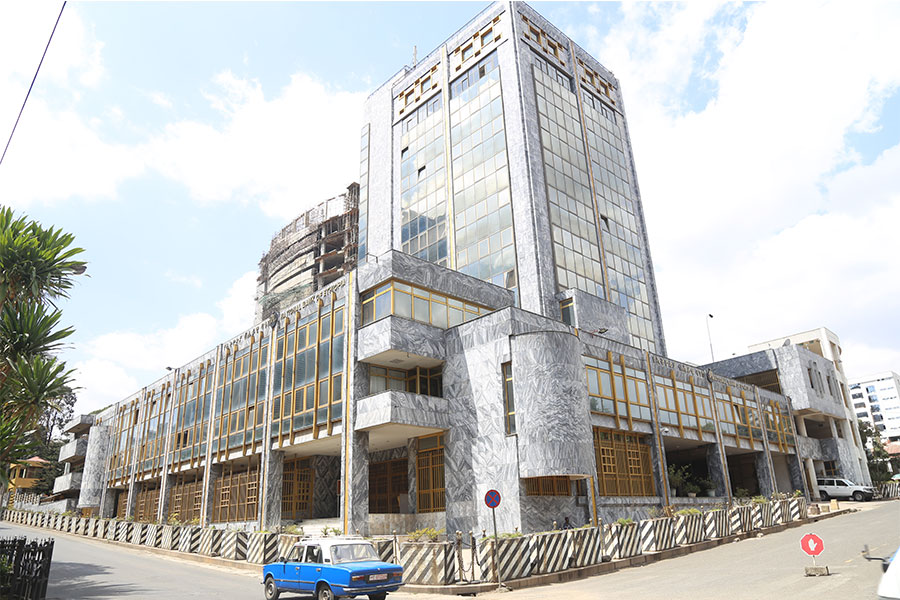
Fortune News | Jan 07,2023
Menna Gizaw, 33, was one of the thousands of drivers that queued at a fuel filling station for hours to fill up her car after fuel shortages hit Addis Abeba last week.
She has been sitting in her Toyota Corolla, her two-year-old son in tow, waiting in a long queue since 8:30am last Tuesday at a Total Ethiopia fuel station in Temenja Yaz, Sierra Leone Street. Before she arrived at the station, she has been to NOC in Bole and two OiLibya stations in Gotera.
She first felt the impact of the benzene shortage on Sunday, January 13, 2019, when she witnessed a long line of cars, some 300 metres long, at a Total Ethiopia fuel station near her home in the Bole Bulbula area.
When she arrived on Sierra Leone Street, the cars were lined all the way down to Global Hotel from the fuel station. By 11:15am, after almost three hours of waiting, she was no closer to getting any fuel. But her lot was about to get even worse.
An hour later, the fuel station ran out of benzene and everyone in the queue was told that a fuel truck was on its way from a reserve depot and would arrive at the station by 5:00pm.
Menna did not give up. She waited for a total of nine hours before it became clear that the fuel truck would not arrive on time.
“It was at 06:30pm that we were told by the supervisor that there is a curfew for when fuel can be transferred from the truck to the station reservoir,” Menna told Fortune. “They promised to fill our tankers the next day.”
For Tariku Tekle Berhan, a supervisor at the fuel station, it was one of the busiest weeks they ever had.
Since the supply of fuel at the station was not adequate, a daily ration of a maximum of 10lt for cars and five litres for motorcycles was allowed.
But the situation only got worse after the benzene in the station’s reservoir dropped to 1,000lt, which led the fuel dispensers to heat up and presented pumping problems.
People are waiting restlessly for fuel at a gas station in Arat Kilo during the shortage of benzene that hit Addis Abeba last week.
As customers waited for the equipment to cool, their frustrations seemed to only increase as additional time was added to the wait.
“The pumps have been working continuously since the morning,” Tariku told Fortune, trying to mollify the people with the help of two policemen.
Unlike the Temenja Yaz Total Ethiopia fuel station, others did not even have the benzene to sell. This meant that congestion and long vehicle lines reigned where benzene was available, fewer vehicles were on the streets and queues for public transport by commuters remained long throughout the week.
“We filled our reservoir on Wednesday [January 9, 2018] with 21,325lt of benzene, but it was gone by [last] Monday afternoon,” said Simegn Nigatu, supervisor of NOC fuel station on Sierra Leone Street, last Tuesday.
The station was expecting the arrival of 22,000lt of benzene two days later.
The cause of the shortages are reported to be blocked roads in Amhara and Afar regions by locals who have erected barriers preventing oil tankers from conveying the fuel from neighbouring Djibouti and Sudan, according to the Ethiopian Petroleum Supply Enterprise. The Enterprise is the only supplier of benzene, jet fuel, gasoline, kerosene and light and heavy black naphtha.
“The fuel trucks coming through Metema started moving to Addis Abeba beginning on January 15,” said Tadesse Hailemariam, CEO of the Enterprise.
The Enterprise distributes petroleum to the 26 oil companies across the country that operate around 800 fuel stations, of which 120 are found in Addis Abeba.
NOC, Total Ethiopia, Yetebaberut Beherawi Petroleum and OiLibya have 92pc of the retail market share in the capital.
Tadesse attended an urgent meeting on January 16, 2018 called by Deputy Mayor Takele Uma as the benzene shortage worsened in the city. Officials from the Ministry of Trade & Industry, the management of fuel retailers and members of the Addis Abeba Police Commission were also in attendance.
The State Minister of Trade & Industry, Eshete Asfaw, had a different view from the Enterprise on the cause of the benzene shortage, saying that there was more to the problem than fuel trucks being unable to reach the capital on time.
“The blockage of the roads is not the main cause of the problem. The problem is the illicit black market trade,” Eshete said. “There is no supply problem, because the supply of fuel from the Sululta depot has been available to retailers.”
Ten surveyed fuel stations that had benzene overnight were emptied by morning. He also pointed out that the fuel was being traded on the black market at 80 Br a litre near the National Stadium.
Tadesse Tilahun, CEO of NOC, had yet another view, laying the blame on the fuel supply chain from Djibouti to retail stations.
“The depots in Djibouti have a low storage capacity. Addis Abeba has too few fuel stations, some of which have low standards and depots near the capital are absent,” he said.
Addis Abeba requires 130 more fuel stations to adequately satisfy demands, according to a study conducted at the Ministry. The city consumes around 65pc of the 1.7 million litres to two million litres of total daily consumption of benzene in the country.
It was the State Minister’s view that the deputy mayor adopted, warning that the city administration will take measures on retailers if they are not able to clamp down on illegal sales of benzene out of their filling stations.
“We do not need a blessing from anyone to solve the problem,” he said after announcing the formation of a task force consisting of the Ministry and the Police Commission to oversee sales at stations.
The fuel shortage gradually improved beginning on Thursday although long queues were still seen in the city as well as vehicles that ran out of fuel throughout the week.
This is not the first fuel shortage that has hit Addis Abeba. There were similar weeks last March after anti-government protesters blocked the main roads leading to Addis Abeba. But the shortage did not have the same effect as last week.
Consuming the largest share of imported fuel, Addis Abeba helped bump up the government’s expenditures of foreign currency for fuel imports.
Ethiopia consumed 5.2 billion litres of fuel, including benzene, last fiscal year, costing the nation around three billion dollars.
Most industry insiders argue that such shortages do not have their causes in the nation’s inability to keep up with the foreign currency costs but in problems of distribution. Instead, they point out that the government takes care to pay its bills on time.
"The government pays more than 250 million dollars a month for fuel imports," said the CEO of the Enterprise. He conceded that there were problems with payment following year’s inflation.
For Serkalem Gebre Kirstos (PhD), an expert in the petroleum industry for more than a decade and a former manager at Dalol Oil, last week’s benzene shortage was a consequence of poor logistics.
“Increasing the number of fuel stations and depots in and around the city is the solution to the logistics problem,” he suggested.
In the meantime, drivers like Menna are hoping there would no longer be such a problem to hit the city.
She had to go back to Total Ethiopia fuel station the next day. She had better luck finally filling up her vehicle, but she still had to wait in a queue for five hours.
PUBLISHED ON
Jan 19,2019 [ VOL
19 , NO
977]

Fortune News | Jan 07,2023

Radar | Nov 20,2021

Fortune News | Mar 02,2019

Life Matters | May 09,2020

Fortune News | Apr 22,2023

Radar |

Fortune News | May 21,2022

Commentaries | Feb 12,2022

Radar | Apr 09,2022

My Opinion | Jul 09,2022

Dec 22 , 2024 . By TIZITA SHEWAFERAW
Charged with transforming colossal state-owned enterprises into modern and competitiv...

Aug 18 , 2024 . By AKSAH ITALO
Although predictable Yonas Zerihun's job in the ride-hailing service is not immune to...

Jul 28 , 2024 . By TIZITA SHEWAFERAW
Unhabitual, perhaps too many, Samuel Gebreyohannes, 38, used to occasionally enjoy a couple of beers at breakfast. However, he recently swit...

Jul 13 , 2024 . By AKSAH ITALO
Investors who rely on tractors, trucks, and field vehicles for commuting, transporting commodities, and f...

Jun 28 , 2025
Meseret Damtie, the assertive auditor general, has never been shy about naming names...

Jun 21 , 2025
A well-worn adage says, “Budget is not destiny, but it is direction.” Examining t...

Jun 14 , 2025
Yet again, the Horn of Africa is bracing for trouble. A region already frayed by wars...

Jun 7 , 2025
Few promises shine brighter in Addis Abeba than the pledge of a roof for every family...